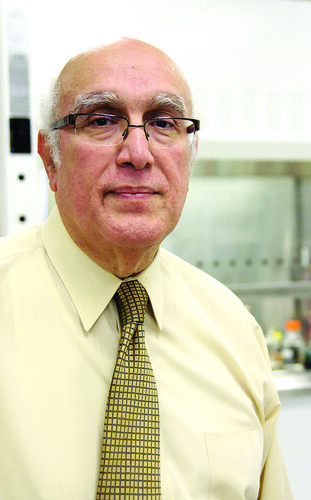
At the Center for Drug Discovery at the Temple Health and Science Campus, Dr. Magid Abou-Gharbia is the person to know.
Abou-Gharbia said the Temple’s Center for Drug Discovery is unique, as it focuses in the area of drug design.
“We identify novel small molecule therapeutics in multiple disease areas to be used as lead drug candidates and also as chemical probes to test biological hypotheses in an effort to increase understanding of the physiological and pathophysiological processes relevant to drug discovery,” Abou-Gharbia said.
Currently, the research is being focused toward new antibacterial and cholesterol-lowering drugs, as well as drugs treating neurodegenerative disorders such as Alzheimer’s disease and stroke.
Abou-Gharbia is no stranger of drug discovery. Prior to his arrival at Temple, he spent 26 years at Wyeth Pharmaceuticals as the senior vice president in drug-discovery research, during which he oversaw and directed Wyeth chemistry-and-screening research efforts for women’s bone and health, neuroscience, inflammation, oncology and cardiovascular disease therapy.
Last year, Abou-Gharbia helped orchestrate an agreement between Temple and the Future University of Cairo. The agreement was initiated in Decemeber 2009, when Abou-Gharbia was invited to Egypt by a few universities, including Cairo University and the School of Pharmacy at the Future University of Egypt, to give a series of lectures on drug discovery.
After the presentation, he was approached by Khaled Azazy, chairman of the board of trustees of FUE and by the deans of FUE’s six colleges, to discuss the possibility of a collaboration between FUE and Temple.
In August 2009, Provost Lisa Staiano-Coico signed the collaboration at a signing ceremony at the U.S. embassy in Cairo. U.S. Ambassador to Egypt Margret Scoby hailed the agreement as a model that should be followed. She called it an example of “the commitment of Future University to offer its students access to the world,” and praised Temple for having “recognized this opportunity for American students.”
Currently, the agreement is between Temple’s schools of Pharmacy, Engineering and Dentistry, but is expected to be applied to the rest of the university in the future.
Abou-Gharbia recently returned from Cairo alongside Dr. David Lebo and Dr. Michael Bronstein, both from the college of pharmacy, teaching three course modules on drug design, biopharmacuetics and biochemistry to FUE students.
Nadia Elkaddi can be reached at nadia.elkaddi@temple.edu.



Be the first to comment